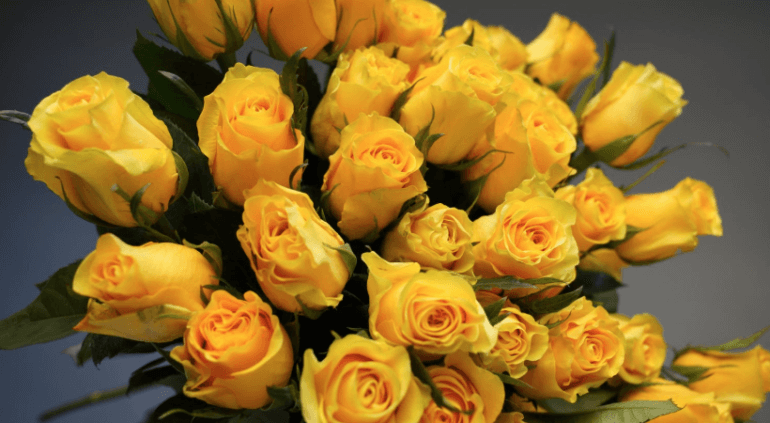
My Pre-Yom Kippur Lesson at Trader Joe’s
A friend did a great kindness for my family and me, so I went to buy her flowers. White hydrangeas, pale yellow roses and bright yellow spray roses adorned my cart at Trader Joe’s as I proceeded to do my weekly shop.
Somewhere along the way, I jarred the flowers while I was loading up. One bright yellow head from the spray roses tumbled out. I sighed, stuffed the rose back into the plastic sleeve, and continued my shopping. I wanted her bouquet to be full, perfect.
Before I headed to the checkout line, I put the yellow spray roses back.
I had the tiniest, niggling thought, But that bouquet is damaged now. You should pay for it. Then another thought: Not really. It’s just one missing flower, and if someone doesn’t want it, they don’t have to buy it. I picked up a different bouquet of the same yellow roses, all stems intact, and went to pay.
Minutes later, I bumped my full cart along the cement parking lot in the late August heat. I had a few more errands, a work deadline, plus some more cooking for Shabbat; as I hurried to get my bags into my trunk, the bag of flowers tumbled out of the cart.
Only the spray roses were damaged. Two yellow rosebuds lay on the cement, glowing bright against the blacktop.
I carefully picked up the flowers, left the rosebuds where they were, and finished loading my car, all the while thinking of the flowers.
The one you put back was missing just one flower. But now two are damaged.
It was as if God was showing me my folly. You left that bouquet for someone else, and now yours is imperfect. A small rebuke. But, to me, a clear one.
I thought of the idea of middah k’neged middah, that God’s response to us is perfectly measured and weighed, according to our actions. That nothing is random; our positive behaviors are rewarded, and our not-so-positive behaviors are responded to. Even in the tiniest thing like a rosebud falling off.
I locked the car, pushed my cart back to the entrance and went back inside the store. I marched over to the flowers, picked up the original bouquet with the broken rosebud stuffed inside, and went to the cashier. I hadn’t even checked the price before. $4.99. Not a bad price to buy teshuvah.
“Hey, how are you doing today?” the cashier smiled at the flowers. “That’s it?”
“I just got a bunch of flowers, but needed just a little bit more to make it complete.”
As the cashier put the bouquet on the counter, one of the heads popped off.
“Oh no!” he said, staring. Then he looked inside and saw the other one I’d slid back in. “Two soldiers down! Hey, wanna go put this one back and grab another one on your way out?”
I thought about his offer. I wasn’t sure it was the right thing to do. I felt like this beautiful bouquet, with all its imperfection, was mine. “It’s OK. I want this one.”
He looked down at the flowers, quietly counting, “Well, hey, you still have thirteen left. That’s good.”
Thirteen left, I thought, as I headed back outside. Perfect.
We’ve been reciting the Thirteen Attributes of Mercy each morning during selichos, the special prayers leading up to and during the Days of Awe. At the end of Yom Kippur, during Neilah, we will recite them many times in those special, last moments of closeness with God.
God Himself taught this prayer to Moses after the Jewish People worshipped the Golden Calf. Although Moses thought that no prayer could help the people who had danced around an idol a mere six weeks after receiving the Torah, God showed that it is never too late for repentance. In fact, God made a covenant with Moshe that the prayerful, repentant recitation of the Thirteen Attributes of Mercy would never be turned back unanswered.
When I say this prayer – which focuses on God’s mercy, tolerance of us, compassion, slow to anger, and kindness – I am overwhelmed by the greatness of God. I am humbled by how patient He is, and how much He loves me.
So much that He gives us a chance, again and again, to do better.
And when we need to be steered back on course, it is done so gently, in the form of a yellow rose.
The Jewish people, God’s beloved, are compared to a rose in the Yom Kippur machzor: “As a rose garden between the thorns, was the appearance of the High Priest.” כְּשׁוֹשַׁנַּת גַּן בֵּין הַחוֹחִים. מַרְאֵה כֹהֵן.
May we use this Yom Kippur to unfurl our loveliest petals and receive the gift of a pure fresh start.
If you found this content meaningful and want to help further our mission through our Keter, Makom, and Tikun branches, please consider becoming a Change Maker today.








5 comments
Sort by
Perfect!! My husband always has good “Jew in Trader Joe’s” stories, but this one tops all of his! Happy and sweet new year to you!
Loved this great inspirational story !
i loved this so much and thank you for sharing. sending you all my love
Beautiful. Humbling!
What a beautiful story!